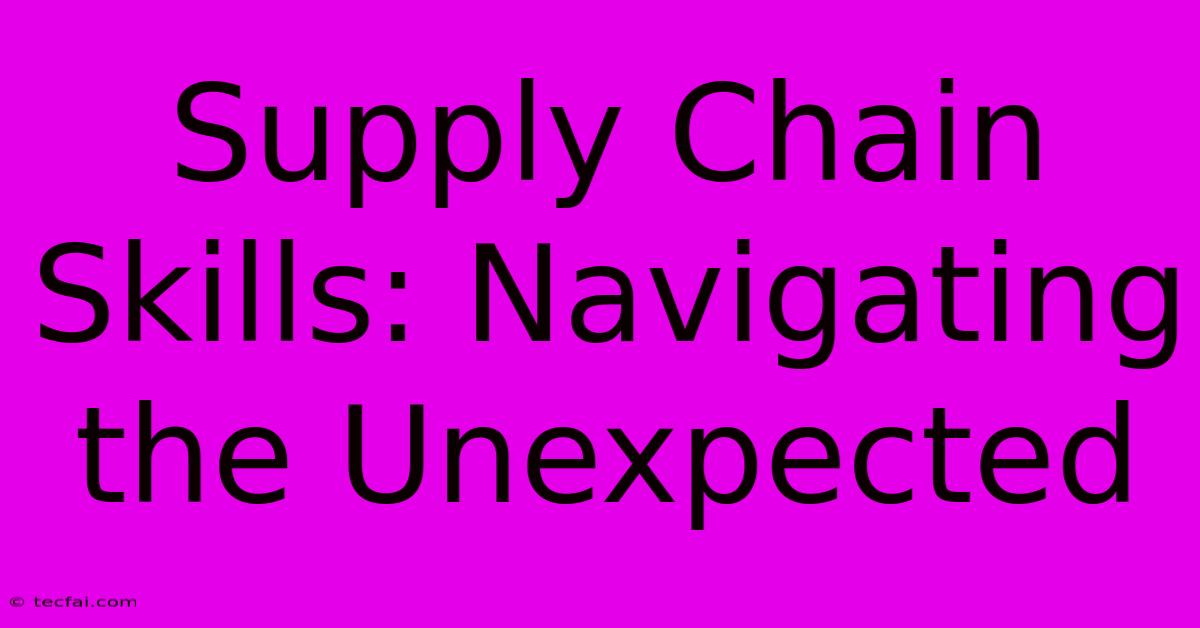Supply Chain Skills: Navigating The Unexpected

Discover more detailed and exciting information on our website. Click the link below to start your adventure: Visit Best Website tecfai.com. Don't miss out!
Table of Contents
Supply Chain Skills: Navigating the Unexpected
The global supply chain, once a predictable machine, now operates in a state of perpetual flux. Unexpected disruptions – from geopolitical instability and natural disasters to pandemics and technological advancements – are the new normal. Successfully navigating this turbulent landscape requires a sophisticated skill set that goes beyond traditional logistics. This article explores the essential supply chain skills needed to not only react to unforeseen events but also to anticipate and mitigate them proactively.
Adaptability and Resilience: The Cornerstones of Success
The most crucial skill in today's volatile environment is adaptability. The ability to swiftly adjust strategies, processes, and even entire business models in response to rapidly changing circumstances is paramount. This includes:
- Agile Planning: Moving away from rigid, long-term forecasts to more flexible, iterative planning models that can accommodate unexpected shifts in demand or supply.
- Scenario Planning: Developing contingency plans for a range of potential disruptions, allowing for proactive responses rather than reactive firefighting.
- Quick Decision-Making: The ability to gather information quickly, analyze the situation effectively, and make informed decisions under pressure is crucial.
Mastering Data Analytics and Technology
Data is the lifeblood of a resilient supply chain. The ability to collect, analyze, and interpret data to understand market trends, predict potential disruptions, and optimize operations is no longer optional; it's essential. Key skills include:
- Data Analysis & Interpretation: Understanding key performance indicators (KPIs), identifying trends and anomalies, and using data-driven insights to improve decision-making.
- Predictive Analytics: Utilizing advanced analytics techniques like machine learning to forecast demand, anticipate disruptions, and optimize resource allocation.
- Digital Supply Chain Technologies: Familiarity with technologies such as blockchain, AI, IoT, and cloud-based platforms that enhance visibility, traceability, and efficiency.
Collaboration and Communication: Building Strong Partnerships
Effective communication and collaboration are vital for navigating disruptions. This involves:
- Strong Stakeholder Management: Building and maintaining strong relationships with suppliers, customers, and other partners across the supply chain.
- Effective Communication: Clearly and concisely conveying information to all stakeholders, ensuring transparency and alignment during times of crisis.
- Cross-Functional Collaboration: Working effectively with teams across different departments (e.g., procurement, logistics, operations) to ensure a coordinated response to disruptions.
Risk Management and Mitigation: Proactive Problem Solving
Proactive risk management is key to mitigating the impact of unexpected events. This requires:
- Risk Identification & Assessment: Regularly identifying and assessing potential risks throughout the supply chain, evaluating their likelihood and potential impact.
- Risk Mitigation Strategies: Developing and implementing strategies to reduce or eliminate identified risks, such as diversification of suppliers, inventory buffering, or alternative transportation routes.
- Business Continuity Planning: Developing comprehensive plans to ensure business operations continue during and after a disruption.
Continuous Learning and Development: Embracing Lifelong Learning
The supply chain landscape is constantly evolving. Continuous learning and development are crucial for staying ahead of the curve. Professionals need to:
- Embrace new technologies and methodologies.
- Stay updated on industry best practices.
- Develop their analytical and problem-solving skills.
Conclusion: The Future of Supply Chain Professionals
The individuals who thrive in today's dynamic supply chain environment are those who embrace change, leverage technology, and prioritize collaboration. By developing these essential skills, supply chain professionals can not only navigate the unexpected but also build more resilient, adaptable, and ultimately, successful supply chains. The future of supply chain management depends on individuals equipped to manage complexity and uncertainty with expertise and foresight.

Thank you for visiting our website wich cover about Supply Chain Skills: Navigating The Unexpected. We hope the information provided has been useful to you. Feel free to contact us if you have any questions or need further assistance. See you next time and dont miss to bookmark.
Featured Posts
-
Auckland Fc National League Record Equal
Nov 30, 2024
-
Brighton 1 1 Southampton Premier Liga
Nov 30, 2024
-
No 10 Wants Haigh To Quit
Nov 30, 2024
-
Taylor Swift Attends Kelces Game
Nov 30, 2024
-
Black Friday Amazon India Worker Strike
Nov 30, 2024
